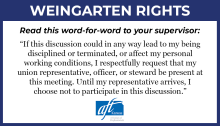As a public employee at a unionized workplace, you have the right to union representation at any meeting or discussion with supervisors or other managers that could lead to any disciplinary action (including being fired) or changes to your working conditions.
These rights are a result of a Supreme Court decision, NLRB v. J. Weingarten, and in Kansas these rights are guaranteed to you by PEERA, the Public Employer Employee Relations Act.
These meetings can take many forms: they can be investigatory, a part of formal disciplinary processes, during work hours, when you’re not on shift, in person, over video chat, or even via text. Asking for union representation at these meetings is part of your Weingarten rights.
If your supervisor, manager, or boss has a meeting with you that covers any of the below conditions, you can invoke your Weingarten rights:
- The purpose of the meeting is to investigate a situation or incident at work about alleged misconduct, where discipline of any kind is on the table.
- You are asked to provide facts, “your side of the story,” evidence, admissions, or confessions of any kind regarding a disciplinary situation.
- Management asks you to explain or defend your conduct in a situation that you fear could reasonably lead to disciplinary action.
It doesn’t matter what management tells you the meeting is about—if at any point in the meeting management starts to ask anything where you feel the result of the meeting could end in disciplinary action, you have the right to ask for representation.
How to invoke your Weingarten Rights
Your employer is under no obligation to tell you about your Weingarten rights. Also, they don’t automatically apply—you have to ask for your representative. You can invoke your Weingarten rights before or during the meeting. To do so, read this statement word-for-word:
(Click here for a PDF version you can print to have handy)
As soon as you invoke your Weingarten rights during a meeting, the meeting stops and your employer has to either 1) grant the request and delay the rest of the meeting until your union rep arrives or 2) deny the request and end the meeting immediately. If they deny your request but keep asking questions, they have committed an unfair labor practice and you then have the right to refuse to answer.
You cannot be punished for invoking your Weingarten rights, and you cannot be punished for refusing to answer their questions if they deny you representation.
What happens when my union rep shows up?
The first thing that happens is that management has to disclose the purpose of the meeting. Your rep is there to be a witness, to protect you from bullying tactics and unfair treatment, and to ask clarifying questions. They can also insist that you be given a chance to speak, if you so choose, and can call for breaks in the meeting so they can meet just with you.

